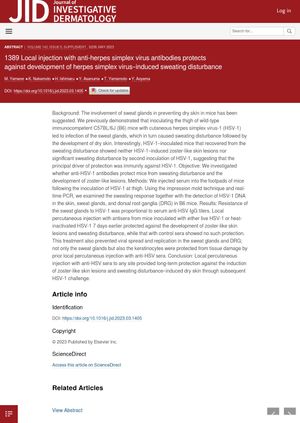Local Injection With Anti-Herpes Simplex Virus Antibodies Protects Against Development of Herpes Simplex Virus-Induced Sweating Disturbance
April 2023
in “
Journal of Investigative Dermatology
”

TLDR Injecting anti-herpes antibodies locally can prevent skin lesions and sweating problems caused by herpes simplex virus in mice.
The study investigated whether anti-herpes simplex virus-1 (HSV-1) antibodies could protect mice from sweating disturbances and the development of zoster-like lesions. The researchers injected serum into the footpads of mice following the inoculation of HSV-1 at the thigh. The results showed that resistance of the sweat glands to HSV-1 was proportional to serum anti-HSV IgG titers. Local percutaneous injection with antisera from mice inoculated with either live HSV-1 or heat-inactivated HSV-1 7 days earlier protected against the development of zoster-like skin lesions and sweating disturbance. This treatment also prevented viral spread and replication in the sweat glands and dorsal root ganglia (DRG); not only the sweat glands but also the keratinocytes were protected from tissue damage by prior local percutaneous injection with anti-HSV sera. The conclusion was that local percutaneous injection with anti-HSV sera to any site provided long-term protection against the induction of zoster-like skin lesions and sweating disturbance–induced dry skin through subsequent HSV-1 challenge.




